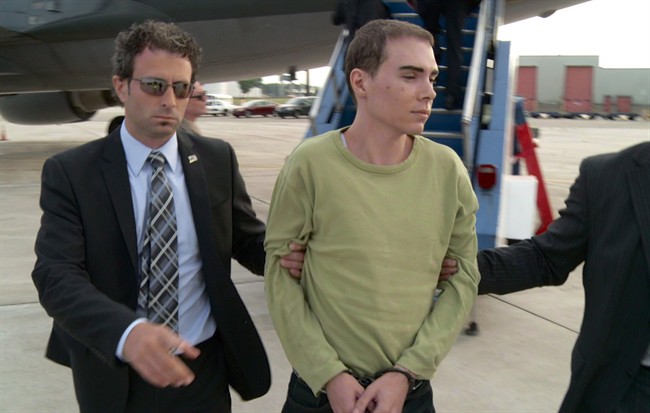TORONTO – In the first day of trial, Luka Magnotta admitted to the 2012 slaying of Jun Lin, but pleaded not guilty citing mental illness.

READ MORE: What is Not Criminally Responsible?
During the Crown’s opening statements, Crown prosecutor Louis Bouthillier told the jury they’d see graphic photos collected from the Montreal apartment where Magnotta committed the murder, as well as the graphic video.
But what the effect of such images will be on the jurors—and the public reading and watching the trial through various news outlets—remains to be seen.
“There is some pretty good research out of the States which says if there is going to be an impact of any kind, then it is probably most related to the really heinous images, because it’s really hard to unsee that image,” said Tara Burke, an associate professor of psychology at Ryerson University.
Though Burke studies pre-trail publicity and how graphic images impact a juror’s decision-making perspective, she says some of the research also applies to the general public.
“There’s also good evidence that jurors might remember those gruesome or graphic details more than things that seem more mundane—that’s just human nature,” she said.
“It’s compelling, it’s hard not to be thinking about it, you’re rehearsing that information in your mind, you’re going over it and over it because perhaps it’s so shocking, which makes it more likely you’re going to remember it.”
Burke said most people have never seen such images before, and referenced serial killer Paul Bernardo’s trial, after which some jurors had to have counselling because it was so traumatic.
But she pointed out significant differences between Magnotta and Bernardo media coverage: The publication ban in Canada during the Bernardo trial meant people looked to the U.S. for information, and allowed for rumours to multiply.
“I know there were some people who sought out the Magnotta video, but a lot of people thought: ‘Why would I watch that?’ There wasn’t a need, let’s say, to go and find it –people knew it was there. Whereas in Bernardo, they didn’t have information so they were looking for any source of it,” she said.
So we asked our Twitter and Facebook followers what they thought about reading the details, and received some quite divided feedback on where people stand. Read through a selection of comments below and feel free to leave your own feedback.
Some people were on the fence:
Laurie Satenstein Sendel wrote: “I feel torn, on one hand I believe part of him wanted all the attention his trial will be getting, rather l am curious to hear what he has to say.”
@bluidvixen tweeted:
There were some readers who felt it was important to have all the details available:
Lloyd Field wrote: “I’d love to know more so I can avoid this happening to me or my loved ones. Stay informed.”
“Give me the whole story or don’t bother with anything. We as responsible people are fully capable of censoring our own information intake,” wrote Brent Eddy.
“I love the details and getting into the minds of other people. It’s thought-provoking and insightful. If people don’t want to know the details, they won’t read on. If they do, let them,” said Austin Fisher.
Nathalie Daze-Lemieux wrote she’d be interested in reading psychiatrist testimony to know “what could possibly drive” Magnotta to commit the murder, and @EMB428 tweeted:
But many Facebook readers didn’t want to be told any of the details:
Katie Clunn: “He doesn’t deserve to be making the news. Don’t tell us anything except his sentence. I feel awful for the jurors having to listen and see what they’re about to witness.”
Alanna Coffey: “I want to know as little as possible about his sick twisted mind. I already have learned way too much and it has scarred me for life.”
Kimmy Ferguson: “Nothing. There is nothing the average citizen can do to affect the outcome of this trial and spreading the details of the crime, and by extension his infamy, just feeds into the reasons the crime was committed in the first place. The details of these crimes (which he has admitted to committing) are not something I want as part of my day and I’ll be dropping news sources from my FB feed if they start reporting the details.”
Joyce Robinson: “That name is being glorified by the media too much. please stop? the public just wants to know the outcome of the trial and that’s it – we don’t need a day by day account. Thank you for asking, Global News.”


Comments